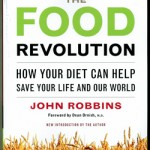The Food Revolution: How Your Diet Can Help Save Your Life And Our World by John Robbins, Conari Press, 2011, 453 pages including index; ISBN 978-1-57324-487-9; $19.95.
By Donald H. Harrison

SAN DIEGO – We have ways of settling into reading and viewing patterns, paying attention to what is comfortable, and dismissing as “background noise” those issues that don’t seem to immediately impact us. So, I probably would have skipped reading this tenth anniversary edition of The Food Revolution had it not been for the fact that this past semester I have been teaching a course in journalism at Grossmont College in neighboring El Cajon.
As any of my fellow faculty probably can tell you, sometimes students can cause us to stretch from long intellectual slumbers, and sit up and take notice of the world around us. In my particular case, the agent of my growth was student, Kamri Jackson, who wrote a number of stories for the online GC Summit about vegetarianism.
 After scouring the Grossmont campus to see what was offered that was healthy to eat, Jackson went on to write reviews of three local vegetarian restaurants. Each of her articles further piqued my curiosity into what all the fuss was about. So, when I received press notification that The Food Revolution was available for review, I asked the publishers to send me a copy.
After scouring the Grossmont campus to see what was offered that was healthy to eat, Jackson went on to write reviews of three local vegetarian restaurants. Each of her articles further piqued my curiosity into what all the fuss was about. So, when I received press notification that The Food Revolution was available for review, I asked the publishers to send me a copy.
Once I started reading the book, it didn’t take me long to understand why Jackson is so concerned about what foods she ingests. The Food Revolution really can make you reconsider some of your basic lifestyle habits. It deals first with the kind of food-borne diseases that you might be swallowing as a result of the “factory farm” practices followed by some of the major producers of meat, poultry and fish. Next, the book describes in excruciatingly painful detail the kinds of cruelties that are endured by hapless animals raised for slaughter. Just one example is that many of them are confined to cages so small they can’t change positions.
The Food Revolution goes on to describe how the livestock industry requires ever increasing acreage of lands—be they former croplands or rain forests—on which to graze cattle. It explains how much more fresh water is required to raise beef than to grow vegetables, and further informs us about the impact large herds of livestock have on the pollution levels in our air and water.
Just as you come to the conclusion that for your own health, for the planet, and for the health of tortured animals, it may be time to switch to a plant-based diet, Robbins (the son of a founder of the Baskin-Robbins ice cream chain) drops another bomb.
Many of our plant-based foods may also be dangerous to our health, as a result of the genetic engineering of plants which involves splicing genes from one species into another. There even are experiments introducing human genes into some plants, so –my God!—some lunches, without our knowing it, could be cannibalistic! I’m not a mashgiach, but I’m willing to bet that some of these so-called vegetables definitely are not kosher.
The book could cause one to despair that nothing we eat is safe, but Robbins thoughtfully provides a reference guide to various websites that devote themselves to safe food, especially those that are raised organically. Robbins preaches persuasively that the real meaning of the message in Genesis 1:26 (when God gave “dominion” to people over the animals) was that we should treat our fellow creatures with compassion and live in harmony with the world.
*
Harrison is editor of San Diego Jewish World